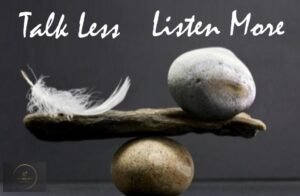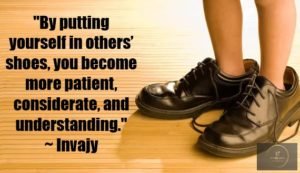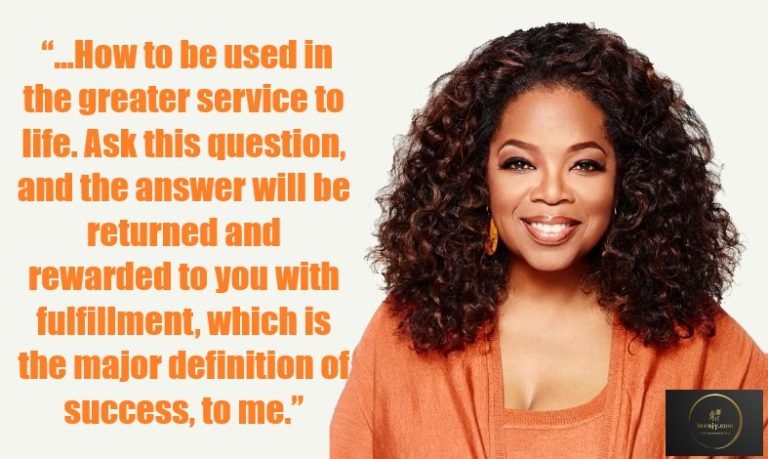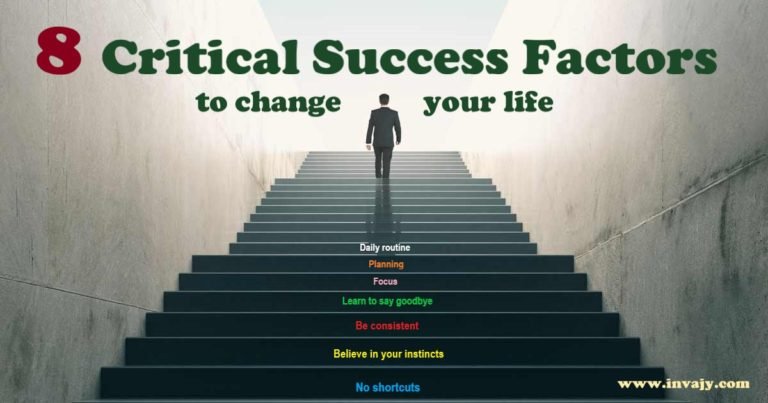Talk Less and Listen More
Embrace the power of “Talk Less, Listen More.” Discover how this simple shift can deepen relationships, enhance understanding, and bring more wisdom into your life.

Communication is a fundamental aspect of human interaction, shaping relationships, fostering understanding, and building connections. While many may associate effective communication with eloquent speech, a crucial yet often overlooked skill is the ability to talk less and listen more.
In a world inundated with noise, honing the art of active listening can lead to deeper connections, enhanced understanding, and improved overall communication. I’m talking about active listening, when you concentrate upon what the other people are expressing and take it in rather than immediately formulating the perfect response. Why talking less and listening more is important? How to revamp your communication skills and talk less and listen more? Let’s dive in…
Talk Less and Listen More
Listening is not merely the act of hearing words; it is a skill that requires attention, empathy, and a genuine interest in what others have to say. Here are the reasons why it pays to learn the art of talk less and listen more:

Building Stronger Connections
The foundation of any healthy relationship, be it personal or professional, lies in effective communication. When individuals prioritize listening over speaking, they create an environment where others feel heard and valued. This fosters trust and strengthens the bonds between people. Talking less and listening more creates a space where meaningful conversations can flourish.
Dale Carnegie also recommends , in his book “How to Win Friends and Influence People“, one of the most influential and best-selling books of all time, that if you can become a great listener and encourage others to speak about themselves, then you’ll gain their respect and admiration.
“To be interesting, be interested.” ~ Dale Carnegie
Understanding Different Perspectives
In a diverse and interconnected world, the ability to understand and appreciate different perspectives is invaluable. When we talk less and listen more, we open ourselves up to a world of perspectives, experiences, and ideas that may have otherwise gone unnoticed. By listening actively, we gain insight into the thoughts and feelings of others, broadening our own understanding of the world. This is crucial for navigating the complexities of a global society.

Listening the Unsaid
When you talk less, listen more; you are able to listen the unsaid. You receive more than what is communicated verbally. You are better able to read non-verbal cues such as eye contact, facial expressions, gestures, posture, use of objects and body language. It helps in understanding the intention behind the words and scenarios.

Resolving Conflicts
Conflicts are a natural part of human interaction. However, they can be exacerbated by a lack of effective communication. Talking less and listening more during conflicts allows individuals to truly understand each other’s concerns, facilitating more constructive and empathetic resolutions.
Enhancing Professional Success
In the professional realm, effective communication is often the key to success. Leaders who prioritize listening create a workplace where employees feel heard and valued. This not only boosts morale but also enhances collaboration and innovation.
Practical Tips for Talking Less and Listening More
Be Present
Be present in the moment, while listening others. Do not get carried away with ruminating thoughts of past and distractive worries of future. It’s important to be mindful and focus on the person speaking. Avoid interrupting and give them your full attention.
Ask Open-Ended Questions
Encourage others to share their thoughts and feelings by asking open-ended questions that invite more than a simple “yes” or “no” response. Using open-ended questions helps you learn about the person that you’re talking to.
Practice Empathy
Practicing empathy is essential for listening well and to understand what speaker is trying to communicate. Put yourself in the speaker’s shoes and try to understand he reason behind whatever they’re saying, you inhabit their mind and see the world from their perspective. Empathy goes a long way in building connections and fostering understanding.

Get Involved
Get involved in the communication. How you do it involves verbal and nonverbal cues. Looking at the person while they’re speaking, nodding your head, not looking away or playing with your cellphone, and using subtle verbal nudges like “mhm,” “oh,” “yeah,” and “wow!” It gives them validation that not only you’re paying attention, but you’re also actually interested in what they’re saying.
Resist the Urge to Interrupt
Allow the speaker to express themselves fully before responding. Seek to understand, not just to respond. Interrupting can convey impatience and hinder the flow of meaningful conversation.
Avoid Digital Distractions
In todays digitally tech-enabled world, getting distracted during a conversation is easy. You may get pings on your phone, emails piling up in your inbox or in-app messages accumulating. Still, it’s important to minimize distractions from digital alerts as much as possible to be fully present in a conversation.
Reflective Listening
A great way to show that you’re listening and that you understand what is being said is to summarize and repeat back what you’ve just heard. This usually sounds something like, “So what you’re saying is…”. This not only reinforces understanding but also signals that you value the speaker’s input.
Ask for Clarity
If you aren’t able to reflect back to them, it could be that you didn’t fully understand what they meant. Don’t be afraid to ask them to clarify. This will show that you’re actively engaged in the conversation.
Wrapping Up!
In a world that often emphasizes the importance of speaking up, the art of talking less and listening more is a powerful tool for building meaningful connections and promoting understanding. By honing our listening skills, we can create a more empathetic and cooperative world, one conversation at a time. So, the next time you find yourself in a dialogue, remember that sometimes, silence can be the most eloquent response of all.






